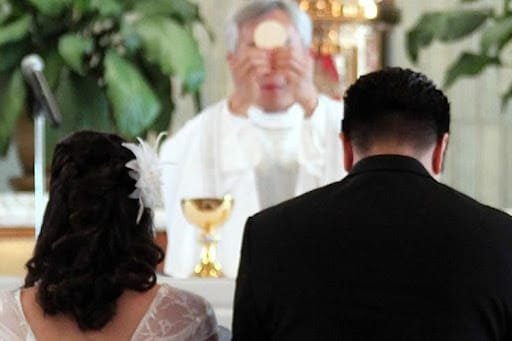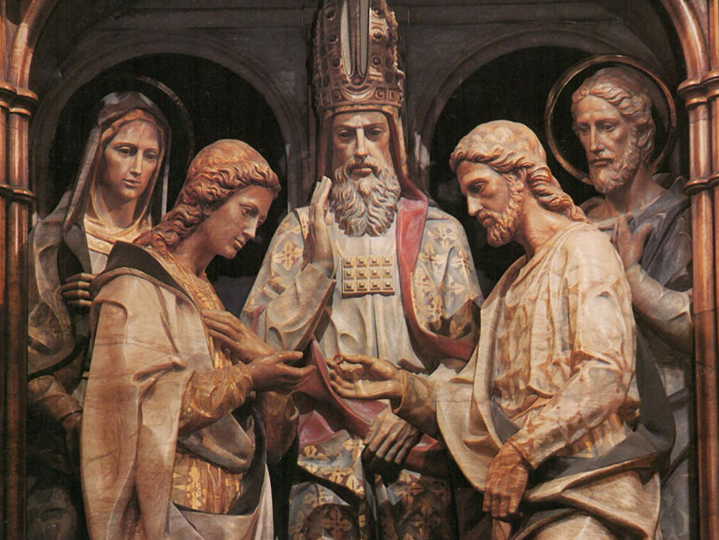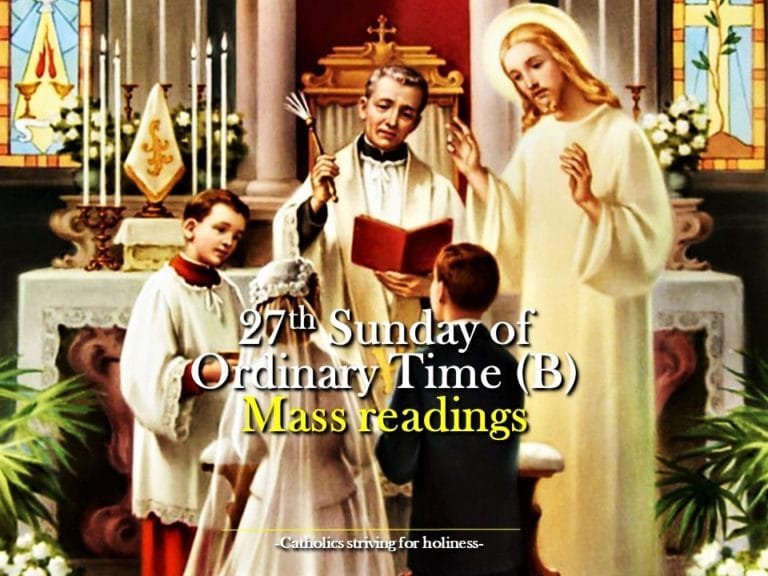POPE FRANCIS ON THE 27TH SUNDAY
IN ORDINARY TIME YEAR B

ANGELUS
Saint Peter’s Square
Sunday, 6 October 2024
________________________________________
Dear brothers and sisters, good Sunday!
Today, in the Gospel of the liturgy (cf. Mk 10:2-16), Jesus speaks to us about marital love. As they have already done on some other occasions, some Pharisees ask him a provocative question about a controversial issue: a husband’s divorce from his wife. They would like to drag him into a quarrel, but he does not let them. Instead, he welcomes the opportunity to draw their attention to a more important discussion: the value of love between a man and a woman.
In Jesus’ time, the condition of the woman in marriage was greatly disadvantaged compared to that of the man: the husband could send his wife away, divorce her, even for trivial reasons, and this would be justified by legalistic interpretations of Scripture. For this reason, the Lord brings his interlocutors back to the demands of love. He reminds them that woman and man were willed by the Creator as equal in dignity and complementary in diversity. In this way they would be each the other’s helper, companion, but they would also be mutually stimulating and a challenge to grow (cf. Gen 2:20-23).
And for this to happen, he emphasizes the need for their mutual gift to be full, to be engaging, to be without “half measures” – this is love – that it be the beginning of a new life (cf. Mk 10:7; Gen 2:24), destined to last not “as long as everything goes well” but forever, accepting each other and living united as “one flesh” (cf. Mk 10:8; Gen 2:24). Of course, this is not easy, this requires fidelity, even in difficulties, it requires respect, honesty, simplicity (cf. Mk 10:15). It requires being open to confrontation, sometimes even to discussion, when it is necessary, but also to be always ready to forgive and to be reconciled to the other. And I tell you: husband and wife, fight as much as you like, provided you always make peace, before the day is over! Do you know why? Because the cold war that comes the next day is dangerous. “And tell me, father, how should we make peace?” – “A gentle caress, like this, is enough”, but never end your day without making peace.
Let us not forget, also, that for spouses it is essential to be open to the gift of life, to the gift of children, that are the most beautiful fruit of love, the greatest blessing from God, a source of joy and hope for every home and all of society. Have children! Yesterday, I received a great consolation. It was the day of the Gendarmerie Corps, and a gendarme came with his eight children! It was beautiful to see him. Please, be open to life, to what God may send you.
Dear brothers and sisters, love is demanding, yes, but it is beautiful, and the more we allow ourselves to be involved by it, the more we discover true happiness in it. And now, let each one of us ask themselves: How is my love? Is it faithful? Is it generous? Is it creative? How are our families? Are they open to life, to the gift of children?
May the Virgin Mary help Christian spouses. Let us turn to her in spiritual union with the faithful gathered at the Shrine of Pompeii for the traditional Supplication to Our Lady of the Holy Rosary.
Source: https://www.vatican.va/content/francesco/en/angelus/2024/documents/20241006-angelus.html
EMPHASIS MINE

ANGELUS
Saint Peter’s Square
27th Sunday in Ordinary Time Year B, 7 October 2018
Dear Brothers and Sisters, Good morning!
This Sunday’s Gospel reading (cf. Mk 10:2-16) offers us Jesus’ words on marriage. The passage opens with the provocation of the Pharisees who ask Jesus if it is “lawful for a man to divorce his wife”, as the Law of Moses provides (cf. vv. 2-4). Jesus firstly, with the wisdom and authority that come to him from the Father, puts the Mosaic prescription into perspective, saying: “For your hardness of heart he” — that is, the ancient legislator — “wrote you this commandment” (v. 5). Thus it is a concession that is needed to mend the flaws created by our selfishness, but it does not correspond to the Creator’s original intention.
And here, Jesus again takes up the Book of Genesis: “from the beginning of creation, ‘God made them male and female’. ‘For this reason a man shall leave his father and mother and be joined to his wife, and the two shall become one’” (vv. 6-8). And he concludes: “What therefore God has joined together, let not man put asunder” (v. 9). In the Creator’s original plan, it is not that a man marries a woman and, if things do not go well, he repudiates her. No. Rather, the man and the woman are called to recognize each other, to complete each other, to help each other in marriage.
This teaching of Jesus is very clear and defends the dignity of marriage as a union of love which implies fidelity. What allows the spouses to remain united in marriage is a love of mutual giving supported by Christ’s grace. However, if in the spouses, individual interests, one’s own satisfaction prevails, then their union cannot endure.
And the Gospel passage itself reminds us, with great realism, that man and woman, called to experience a relationship of love, may regretfully behave in a way that places it in crisis. Jesus does not admit all that can lead to the failure of the relationship. He does so in order to confirm God’s plan, in which the power and beauty of the human relationship emerge. The Church, on the one hand, does not tire of confirming the beauty of the family as it was consigned to us by Scripture and by Tradition; at the same time, she strives to make her maternal closeness tangibly felt by those who experience relationships that are broken or that continue in a difficult and trying way.
God’s way of acting with his unfaithful people — that is, with us — teaches us that wounded love can be healed by God through mercy and forgiveness. For this reason in these situations, the Church is not asked to express immediately and only condemnation. On the contrary, before so many painful marital failures, she feels called to show love, charity and mercy, in order to lead wounded and lost hearts back to God.
Let us invoke the Virgin Mary, that she help married couples to always live and renew their union, beginning with God’s original Gift.
Source: https://www.vatican.va/content/francesco/en/angelus/2018/documents/papa-francesco_angelus_20181007.html
EMPHASIS MINE.

ANGELUS
Saint Peter’s Square
27th Sunday in Ordinary Time Year B, 4 October 2015
Dear Brothers and Sisters, Good morning!
[…]We will keep our gaze fixed on Jesus so as to identify, on the basis of his teaching of truth and mercy, the most opportune paths for the appropriate commitment of the Church with families and for families, so that the original plan of the Creator for man and woman may be implemented and operate in all its beauty and its strength in today’s world.
This Sunday’s Liturgy presents again the fundamental text of the Book of Genesis on the complementarity and reciprocity between man and woman (cf. Gen 2:18-24). Therefore — the Bible states — a man leaves his father and his mother and cleaves to his wife, and the two become one flesh, that is, one life, one existence (cf. v. 24). In this unity, spouses pass on life to new human beings: they become parents. They participate in the creative power of God himself. But be mindful! God is love, and one participates in his work when one loves with Him and like Him. For this purpose — St Paul states — love has been poured into our hearts through the Holy Spirit who has been given to us (cf. Rom 5:5). This is also the love which is given to spouses in the Sacrament of Marriage. It is love that nourishes their relationship, through joy and pain, untroubled and difficult moments. It is love that gives rise to the desire to bear children, to await them, welcome them, raise them, teach them. It is the same love which, in today’s Gospel, Jesus shows toward children: “Let the children come to me, do not hinder them; for to such belongs the kingdom of God” (Mk 10:14).
Today let us ask the Lord that all parents and educators of the world, as well as the whole of society, make themselves instruments of welcome and of that love with which Jesus embraces the littlest ones. He looks into their hearts with the tenderness and solicitude of a father and of a mother at the same time. I think of so many children who are hungry, abandoned, exploited, forced into war, rejected. It is heartbreaking to see images of unhappy children, with a bewildered gaze, who flee from poverty and conflicts, knocking at our doors and on our hearts, begging for help. May the Lord help us to be not a society-fortress, but a society-family, able to welcome, with appropriate rules, but to welcome, to always welcome, with love!
I invite you to support the works of the Synod with prayer, so that the Holy Spirit may render the Synod Fathers fully docile to his inspiration. Let us invoke the maternal intercession of the Virgin Mary, uniting us spiritually to those who, at this moment, in the Shrine of Pompeii, recite the “Prayer to Our Lady of the Rosary”.
SOURCE: https://www.vatican.va/content/francesco/en/angelus/2015/documents/papa-francesco_angelus_20151004.html

ANGELUS
Saint Peter’s Square
27th Sunday in Ordinary Time Year B, 3 October 2021
________________________
Dear brothers and sisters, buongiorno!
In the Gospel of today’s Liturgy we see Jesus react somewhat unusually: He is indignant. And what is most surprising is that his indignation is not caused by the pharisees who put him to the test with questions about the legality of divorce, but by his disciples who, to protect him from the crowd of people, rebuke some children who had been brought to Jesus. In other words, the Lord is not angry with those who argue with him, but with those who, in order to relieve him of his burden, make the children go away from him. Why? It is a good question: why does the Lord do this?
Let us remember – it was the Gospel reading two Sundays ago – that Jesus, performing the gesture of embracing a child, identified himself with the little ones: he taught that it is indeed the little ones, namely, those are dependent on others, who are in need and cannot reciprocate, who must be served first (see Mk 9:35-37). Those who seek God find him there, in the little ones, in those in need: in need not only of material goods, but of care and comfort, such as the sick, the humiliated, prisoners, immigrants, the incarcerated. He is there: in the little ones. This is why Jesus gets angry: any affront to a little one, a poor person, a child, a defenceless person, is done to Him.
Today the Lord picks up this teaching again and completes it. In fact, he adds: “Truly, I say to you, whoever does not receive the kingdom of God like a child shall not enter it” (Mk 10:15). Here is what is new: the disciple must not only serve the little ones, but also acknowledge himself as a little one. And every one of us, do we recognise ourselves as small before God? Let’s think about it, it will help us. Awareness of being little, awareness of the need of salvation is indispensable for receiving the Lord. It is the first step in opening ourselves up to Him. Often, however, we forget about this. In prosperity, in wellbeing, we have the illusion of being self-sufficient, that we are enough, that we do not need God. Brothers and sisters, this is a deception, because each one of us is a person in need, a little one. We must seek out our smallness and recognise it. And there, we will find Jesus.
In life, recognising one’s littleness is a starting point for becoming great. If we think about it, we grow not so much on the basis of our successes and the things we have, but above all in difficult and fragile moments. There, in our need, we mature; there we open our hearts to God, to others, to the meaning of life. Let us open our eyes to others. Let us open our eyes, when we are little, to the true meaning of life. When we feel small in the face of a problem, small in front of a cross, an illness, when we experience fatigue and loneliness, let us not get discouraged. The mask of superficiality is falling and our radical weakness is re-emerging: it is our common ground, our treasure, because with God weakness is not an obstacle but an opportunity. A beautiful prayer would be this: “Lord, look at my frailties…” and to list them before Him. This is a good attitude before God.
Indeed, it is precisely in weakness that we discover how much God takes care of us. The Gospel today says that Jesus is very tender with the little ones: “He took them in His arms and blessed them, laying His hands upon them” (v. 16). The difficulties and situations that reveal our weakness are privileged opportunities to experience His love. Those who pray with perseverance know this well: in dark or lonely moments, God’s tenderness towards us makes itself, so to speak, even more present. When we are little, we feel God’s tenderness more. This tenderness gives us peace; this tenderness makes us grow, because God draws close to us in His way, which is nearness, compassion and tenderness. And, when we feel we are little, small, for whatever reason, the Lord comes closer, we feel he is closer. He gives us peace; he makes us grow. In prayer the Lord draws us close to him, like a father with his child. This is how we become great: not in the illusory pretence of our self-sufficiency – this makes no-one great – but in the strength of placing all our hope in the Father, just like the little ones do, they do this.
Today let us ask the Virgin Mary for a huge grace, that of littleness: to be children who trust the Father, certain that He will not fail to take care of us.
_____________________________________________
SOURCE: https://www.vatican.va/content/francesco/en/angelus/2021/documents/papa-francesco_angelus_20211003.html
EMPHASIS MINE.
Copyright © Dicastero per la Comunicazione – Libreria Editrice Vaticana
SEE AS WELL:
Stay updated: subscribe by email for free TO OUR NEW WEBSITE www.catholicsstrivingforholiness.org (PUT YOUR EMAIL IN THE SUBSCRIBE WIDGET).
We are also in www.fb.com/Catholicsstrivingforholiness. Kindly help more people in their Christian life by liking our page and inviting your family, friends and relatives to do so as well. Thanks in advance and God bless you and your loved ones! Fr. Rolly Arjonillo
